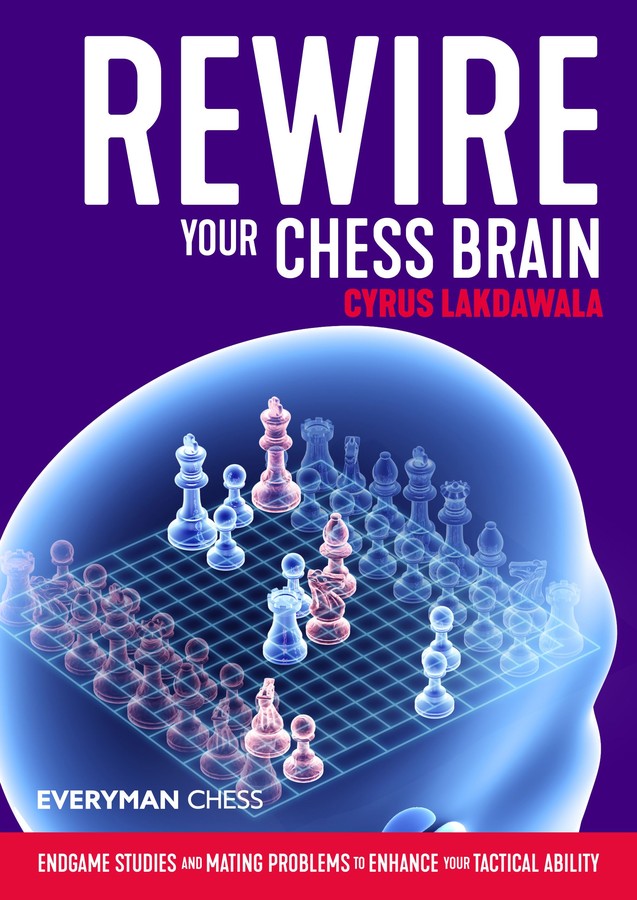| Nivå | C-D |
| Utgivelsesdato | August 2020 |
| Forfatter | |
| Pris | 320 NOK |
Rewire Your Chess Brain
En stor bok med både masse sluttspillstudier og mattproblemer, presentert som treningsstoff for ambisiøse sjakkspillere! Her trenes både kreativitet og variantregning, og dessuten serveres det motiverende skjønn sjakk.
Simen Agdestein er blant dem som har brukt særlig sluttspillstudier mye i trening av elevene sine.
Fra forfatterens innledning:
Question: Why are composed chess studies and problems so important? After all, virtually every position we encounter in this book is a fictional construct, rather than a real-life battle.
Answer: The point is that a chess game is nothing more than a series of problems placed before us. If we become skilled at solving composed studies/problems, our over-the-board games should feel easy by comparison.
Look, I’m no artiste. I always felt that my job was to win a chess game or, failing that, avoid loss. I retired from tournament chess in 2019 (I suffered a heart attack during a game in 2016 and risked another by continuing to play in tournaments) and took up solving Rewire Your Chess Brain 8 endgame studies and mating problems instead, just for fun.
At first, they were anything but fun. All I got for my efforts were – I apologize for this indelicate imagery! – analytical turds floating all over the board. Belief in my ability began to reduce as disillusionment grew. Then, after a while, the solving of a study or problem – especially an exceptionally difficult one – led to an unfamiliar mathematical euphoria, which I quickly came to crave as a drug to an addict. I even felt a stab of elation at solving a portion of a problem.
I had one rule of solving: No computers at the start. I grew up in an era where NASA sci-entists were the only ones who had access to computers. The rest of us were forced to use our imperfect brains. So forgive me when I state that reliance upon computers is an aph-rodisiac for the mentally lazy. Vishy Anand once said that the minute he turned his com-puter on, his brain solving process grinded to a halt, since it began to allow the computer to think for him.
The world of chess composition is a living, breathing, autonomous state. They too have their Morphys, Laskers, Capablancas, Alekhines, Tals, Fischers, Karpovs, Kasparovs and Carl-sens, but with different names, unfamiliar to many of us who live in the “real” chess world.
Forlagets egen omtale
PDF-utdragRewire Your Chess Brain is not your average chess book. It does not deal with opening theory or middlegame strategy. It focuses purely on problems and studies, all of which are the results of artificial construction rather than scenes from real-life battles.
In a chess study, White has to play and win (or draw). In a chess puzzle, White has to force mate in a stipulated number of moves. The starting positions in both forms rarely resemble anything found over the board in real life play. However, the solutions are invariably surprising and often quite beautiful. The best examples of both forms have often been compared to great works of art.
However, these are not mere gallery pieces, lacking practical application in real life play. Solving these puzzles can be extremely challenging and will, without question, improve the “real world” tactical ability of anyone attempting to do so.
Prolific chess author and coach Cyrus Lakdawala has been intrigued by studies and problems all his life. When training his students he often sets them studies and problems to solve. Many of them who have adopted this technique have seen extraordinary increases in their chess ratings. In this book Lakdawala assembles the problems and studies that are most effective to improve tactical ability. Work your way through this book and you will undoubtedly see the results in your own games
| Innbundet? | Nei |
| Type | Bok |
| Språk | Engelsk |
| Antall sider | 528 |

